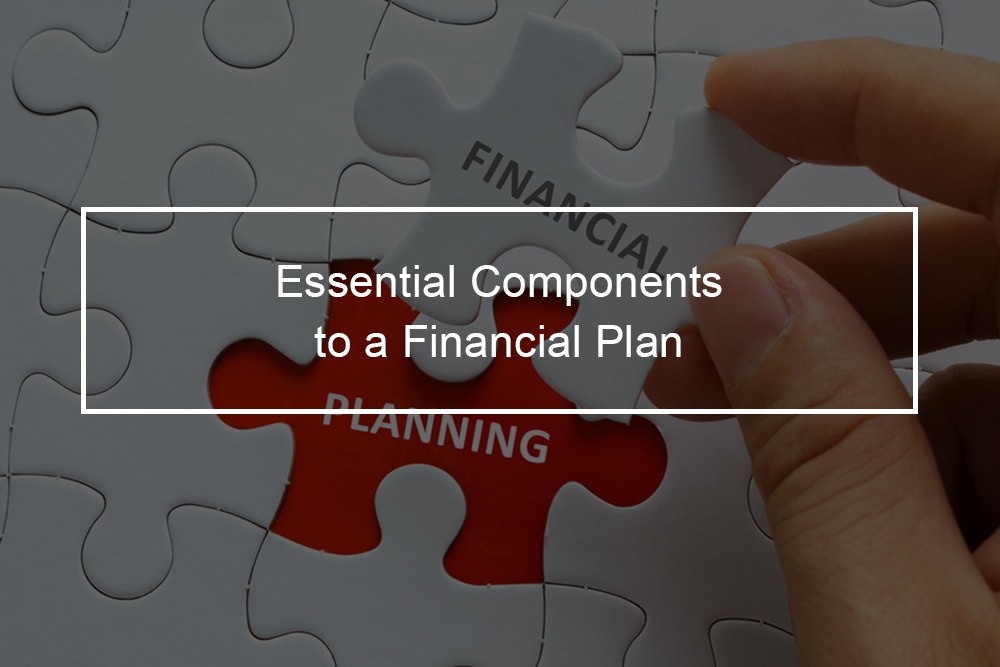
The Financial Plan And Its Key Components
Financial decisions involve trade-offs: forks in the road. If you do not have a well-strategized plan, you are acting as though it does not matter to you. Which route should you take? Financial planning can assist you in answering that question and many others that appear throughout your life. Financial plans are different for everyone; however, there are essential components that a well-designed plan should generally cover. The aim of a financial plan, professionally drawn up, is much the same as the purpose of planning a trip. You determine your objective; you select the best route for reaching it, and having planned well, you follow your plan till you reach your goals. The concept is too simple, though. The elements affecting your financial plan are more sophisticated than the interstate highway. The possibilities of reaching a secure financial future are better when based on a sound plan. Let us discuss the various components of the financial planning process to get the complete picture of one’s financials.
Cash-Flow management
To truly understand your current liabilities, assets, and net worth, it is vital to identify in writing the status of your personal and professional income and expense balance. We incorporate goal planning as part of this step since setting realistic goals and attaining them is mostly dependent on your ability to save those objectives. Objectives and goals should be listed by priority and should be specific and measurable as possible. Other aspects of cash flow management include the debt elimination, if required, and comprehensive savings plan.
Investment management
Often when people think of financial planning, they think of investing. Most people wonder, what is the latest hot stock or what is the best mutual fund. Research has shown that those are not good questions since investing is not about the current stock or timing the market. Investing is a strategy that takes your objectives, your risk tolerance, and your timeline into consideration. Then, establishing the best investing strategy to meet those objectives. Your investing plan should be the foundation for meeting education goals, retirement goals, and other long term goals.
If done right, your portfolio strategy should comprise an asset allocation mix that reduces risk via a global and well-diversified (well correlated) set of assets like bonds, stocks, and other alternatives. The asset mix and correlation elements of the portfolio are personalized to your particular needs and are significant to the long-term success of the portfolio.Investing is a highly individual based on many factors. The best way to begin is to write down your investment Policy Statement (IPS), which outlines your objectives, risk levels that you are willing to take, and general strategy (passive versus active investor). The IPS can then be your convoy for all the investments that you have or that you make your financial advisor make on your behalf.
Tax planning
To preserve and maximize your investment returns, an eye toward tax management is vital. There are several ta-reduction strategies and methods for generating tax-free income and wealth transfer considerations, which can be attained by way of tax planning. Despite your age, one should consider, understand, and proactively adopt this. For instance, Debt Funds can benefit you more when you hold for more than three years than bank fixed deposits from a tax perspective. Even though financial planners are generally not CPA’s, there is a base level of tax knowledge that a financial planner might offer in terms of the tax consequences of a provided financial strategy. A CPA is often recommended for professional consultation in a sophisticated tax case.
Insurance assessment
Most people often overlook this vital aspect of financial planning while charting out their financial plan. So what happens to your family if you die prematurely? Or what if you can no longer work due to a disability? How will your portfolio be affected by a long-term care event? Evaluate the kind of insurance you require to protect yourself and your assets together with your loved ones. Ensure sure you have sufficient cover in your plan. A sound financial plan outlines the kinds of insurance accessible to offset these threats that can proactively offer survivor benefits, income protection, and funds to offset future qualified medical expenses. Insurance types can include disability, life, health, property, and vehicle insurance, to name a few. Buy a policy based on your needs, lifestyle, and whether you have dependents. Based on your stage in life, your insurance needs(risk management needs) will change and evolve.
Retirement planning
You should also account for the day you retire. A good financial plan stimulates your lifestyle burn, which is the amount of money you want or anticipate on an after-tax basis to power your lifestyle. This creates a benchmark for the plan and dovetails with other planning segments. How much do you require to save, and what rate of return do you require to meet your spending in retirement? The lifestyle burn acts as a baseline to recognize if you are on track for retirement and, if not, how far off you are. Typically retirement planning aids you set a goal for when you want to retire and your income and lifestyle objectives during retirement. Your financial advisor can determine if your current savings are on track and offer guidance on strategies to assist achieve those goals. Retirement planning will also help you answer questions such as-
- How to increase my pension?
- Should you invest in risky assets after retirement?
- How to get regular income?
- Can I retire early?
- Is my retirement corpus enough?
- How to manage my retirement corpus?
Estate Planning
Nobody likes to think about it, but big fortunes are frequently lost from having no clear financial plans. Are you aware of how much federal and state estate tax you are facing today and in the future? A sound financial plan outlines how much estate tax you would be subject to with and without planning, including lifetime exemptions, where assets are located, and how assets are titled. It should show your future estate taxes based on the projected growth of your estate. The aim is to solve for the liquidity required so that you can transfer the maximum amount of wealth to your charities, heirs, or a private foundation.
Despite your age, estate planning is an integral element of long-term financial planning. You can manage the distribution of your assets, both upon death and during life, with a proper estate plan structure in place for your distinct circumstances and wishes. Besides, keeping your estate plan update is just as important as creating it in the first place. Anyone or all of these elements of financial planning make up what is a relatively sophisticated financial life. Financial planning offers you a written personalized plan putting it all into perspective.
Considering your priorities
The core of a financial plan is an individual’s clearly defined goals. They might include funding a college education for the children, purchasing a larger home, retiring on time, starting a business, or even leaving a legacy. No one can tell you how to prioritize these objectives. Nonetheless, a professional financial planner may be able to assist you in selecting a detailed savings program and specific investments that will help you tick them off, one by one.
Note that along the way, there will be many life events that will affect your financial plan. For example, a divorce, the birth of a child, a large inheritance, home purchase, retirement, loss of a spouse, or job loss. Any of these events can mentally change the road you are and create new forks. Each road might have different answers to various people. Working with a Certified financial planner can be vital in making sure you have a smooth ride on the specific route you are on. Start financial planning early and get to experience the value it can bring to your life.












